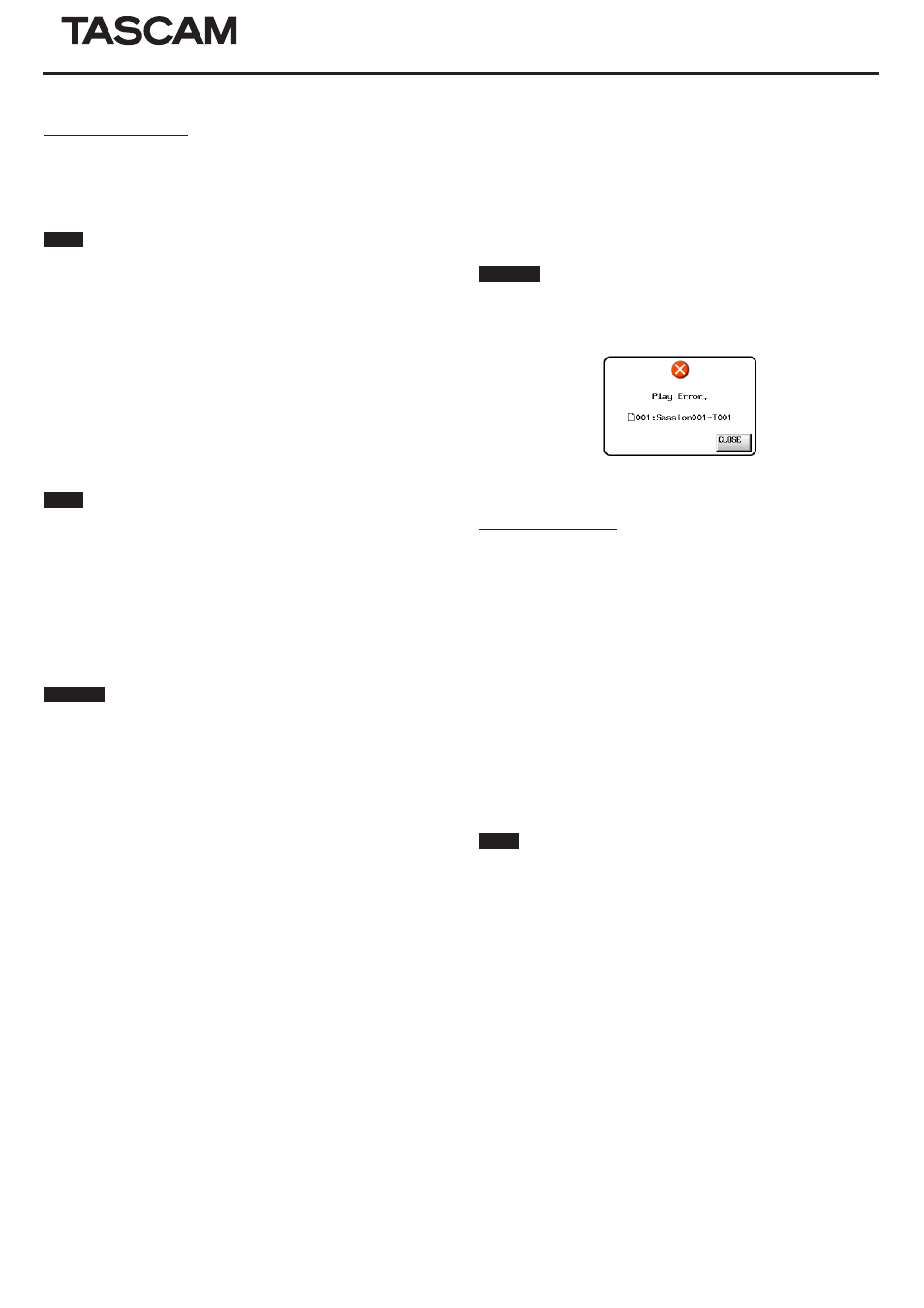Hs-8 – Teac HS-8 Firmware V1.40 User Manual
Page 5

TASCAM HS-8
5
HS-8
Network function (FTP, Telnet and VNC) details
FTP (file transfer protocol)
By using an FTP client application, you can transfer files between this unit and
a computer.
Connect to this unit and login in the same way as with other FTP servers. After
connecting and logging in, “A:” and “B:” will appear in the root directory. These
correspond to the unit's CF1 and CF2 slots. If the corresponding slot does not
contain a card, the “A:” or “B:” will appear empty.
NOTE
iTo display Japanese, use an FTP application that supports Unicode.
iAlways set the maximum number of simultaneous transfers of the FTP client
application to “1”. If not set to “1” files cannot be transferred properly.
iFor information about FTP client applications that have been confirmed to
work properly with this unit, please contact TASCAM customer support.
Required settings for connecting by FTP
The following settings are necessary for connecting to this unit by FTP.
IP address:
This unit's IP address is shown in the
IP Address
field of the
REMOTE SETUP
screen
ETHERNET
page.
Port:
21
User name:
HS-8 (cannot be changed, case sensitive)
Password:
HS-8 (default, case sensitive)
This setting can be changed by using the
Password
Change
button on the
REMOTE SETUP
screen
ETH-
ERNET
page.
NOTE
iThe number of simultaneous connections is “1”. Depending on the FTP client
application, two simultaneous connections with this unit might be possible,
but files might not be transferred correctly, so we recommend that you do not
use two or more simultaneous FTP connections with this unit.
iFTP connections cannot be made when EXTERNAL Control has been set to
LOCK on the
Lock Setup
screen. Likewise, setting this to LOCK will end
any active FTP connection.
iChanging any settings on the
REMOTE SETUP
screen of the
ETHERNET
page will also end any active FTP connection.
Working with files using an FTP client application
CAUTION
When adding, overwriting or deleting files/folders from this unit using an FTP
client application, always follow the procedures below to rebuild the entire CF
card that was changed.
If you do not rebuild the card, inconsistencies between the syetem files and
audio files will occur, leading to problems such as the following.
i
Added files and folders will not appear
i
Deleted files and folders will continue to appear
i
Overwritten files will not play back properly
Procedures for rebuilding the entire CF card
1. Open the project selection screen.
2. While no project is selected, press the MENU button to open a pull-up
menu.
3. Press the REBUILD button in the pull-up menu.
4. When a confirmation message appears in a pop-up window, press the
OK button or the DATA dial.
p Read files from the unit
You can read files from this unit at any time.
p Add new files to the unit
You can add files to this unit at any time.
When recording, if you add BWF files to the current session, they will be
shown in the list with existing files, recorded files and added files in that
order.
p Overwrite existing files on the unit
You can only overwrite the current take when the unit is stopped.
You can overwrite other existing files at any time.
However, if the
PLAY SETUP
screen
GENERAL
page
Play Mode
set-
ting is
All Take
, during playback you might not be able to overwrite
the take following the current take depending on the timing.
p Delete a file on the unit
The current take can be deleted only when the unit is stopped. Files other
than the current take can be deleted at any time.
p Add a new folder to this unit
You can add a new folder to this unit at any time.
p Delete a folder from this unit
You can only delete the current folder when stopped.
You can delete any folder other than the current from this unit at any time.
p Edit the names of files/folders on this unit
You cannot edit the names of files/folders on this unit.
CAUTION
iIf overwriting causes the size, number of channels, bit-rate or sampling
frequency of an audio file to be different from the previous file, inconsistencies
could occur between the system files and audio files. If such an inconsistency
occurs, the following error message will appear when you start playback.
iDo not overwrite an existing audio file with a file that uses a different sampling
frequency. The inconformity that results could become unresolvable.
Remote control by Telnet
Remote control of this unit is possible over Ethernet via port 23 using Telnet.
Necessary setting for connections by Telnet
The following settings are necessary for connecting to this unit by Telnet.
IP address:
This unit’s IP address is shown in the
IP Address
field of the
REMOTE SETUP
screen
ETHERNET
page.
Port:
23
Password:
HS-8 (default, case sensitive)
This setting can be changed by using the
Password
Change
button on the
REMOTE SETUP
screen
ETH-
ERNET
page.
Connecting to the unit by Telnet
1.
After connecting with this unit by Telnet using the above IP address and
port number, press the computer Enter key.
2.
When
Enter Password
appears on the Telnet console, input the
above password and press the Enter key.
3.
When login succeeds,
Login Successful
appears on the Telnet
console. Input “exit”and press the Enter key to end the Telnet connection.
NOTE
i2 simultaneous Telnet connections are possible.
iTelnet connections cannot be made when
EXTERNAL Control
has been
set to
LOCK
on the
Lock Setup
screen. Likewise, setting this to LOCK will
end any active Telnet connections.
iChanging any settings on the
REMOTE SETUP
screen of the
ETHERNET
page will also end any active Telnet connection.
iThe commands used for the telnet control are the same as for RS-232C control.
Please see the RS-232C documentation available on our website and contact
TASCAM customer support if additional help is needed.
